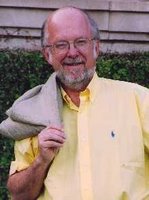 Ronald C. White, Jr. lectured in my favorite class today. He wrote one of our texts, Lincoln's Greatest Speech and since he's temporarily living in D.C., he obliged us with a visit. In his very quiet, engaging way, he discussed the book and other Lincoln articles we read for the class.
Ronald C. White, Jr. lectured in my favorite class today. He wrote one of our texts, Lincoln's Greatest Speech and since he's temporarily living in D.C., he obliged us with a visit. In his very quiet, engaging way, he discussed the book and other Lincoln articles we read for the class.Learning more about Lincoln's life was a fascinating venture, especially his approach to public speaking and his religious life, which are two topics Mr. White emphasized. Hearing about Mr. White's meetings with President Bush added to the analysis.
Lincoln was a man of few words, carefully chosen, during his presidency. Before he began his time in the White House, he was more free with his speech. After he took the oath, he accepted far fewer speaking engagements and spent more time crafting his words before he spoke. Mr. White suggested that presidents in our time would do well to have a similar policy; that people would be more eager to listen if our public figures were not in the spotlight so frequently.
My question to him was: Would the media, would our culture, allow a president to be less verbose? How would people respond to a president who turned down most speaking engagements? Obviously, the president is asked to speak far more frequently than he does, but what would happen if he only appeared three times a year to make a speech? How would the public react to speeches of less than a thousand words?
I agree with Mr. White that it would probably be better if our presidents were less celebrity and more statesman, but I wonder if that is possible in a TV culture. What do you think?
1 comment:
But I wonder how one would "step forward" to be a statesman while remaining in the public eye so that they could garner respect... It feels like a Catch-22. Basically, I think it would take more than a few stepping up, more like the entire Congress, White House, and governors everywhere.
Post a Comment